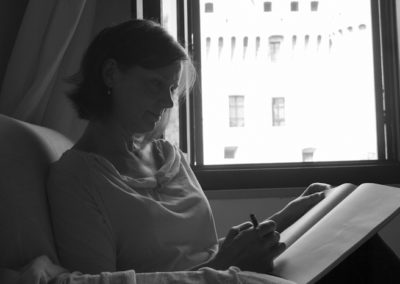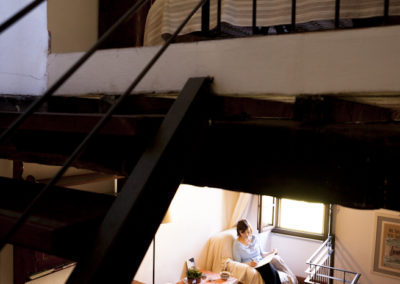Mary Beth Hughes
I came to Civitella Ranieri with the firm plan to complete a last section of a novel long underway. I imagined a quiet but palatial room with only the call to the famous dinners to mark the time. Soon the work of my Fellows – their presentations, conversations, studio showings – proved too fascinating, too compelling, and my scheme expanded and shifted ground. I did work on that elusive section of the novel, and began a new story inspired in part by a surprising tale told at dinner.
Pelican Song
I was the kind of thirty year old who had only recently left adolescence behind. I was mostly a modern dancer. I rehearsed, I went to class. I worked the concession stand in an art-movie theater where actors and filmmakers ushered. A novelist with strong powers of concentration manned the ticket booth. I had a studio apartment in Gramercy Park that looked out on an ivied brick wall. When I wanted to get out of the city I would take the bus to visit my mother in central Jersey. My mother was far along into her second marriage. She and her husband built a house in an abandoned peach orchard with the proceeds from the sale of my childhood home and his antique-car-supply boutique. They acted as their own general contractors and saved a lot of money. Now that the house was finished they had their collective eye open for an investment scheme.
Like the ticket taker, the man my mother married was really a novelist. My mother created an author’s den for him in the upper portion of their beautiful new house. She decorated it with my lost father’s old desk, very attractive and manly with brass inlays, and his leather chair. Everything faced out over the in-ground swimming pool and the putting green, and beyond that to the old orchard and then the woods. Couldn’t be more inspiring, everyone said.
My mother, always interested in words, took seriously, in a way lost to the world with my generation, the role of help-mate. She typed her husband’s manuscripts, judiciously editing them as she went along. She served lunch on a tray, left atop a small marble pedestal outside the den door. And she checked the mailbox at the end of the long drive for the latest news from his literary agent. If there was another rejection waiting, she prepared the gentlest delivery.
At the art-movie theater in the West Village we took failure for granted. In the house in the orchard the stakes were much higher. Each time a rejection letter came, though often flattering, even encouraging, it represented an enormous blow to the whole enterprise. Even so, I decided to try my own hand at fiction writing. I joined a group. I wrote one-paragraph stories that I liked to read out loud to my mother over her kitchen speakerphone while she was preparing the meals that went upstairs. For Christmas that year, my mother’s husband gave me a lovely, quite serious pen, with a kind note fold inside the box. But at the movie theater no one allowed my mini-stories any more importance than my modern dance performances. My biggest obstacle to respect, however, had to do with men.
I had an odd figure for a modern dancer. Rubenesque, my composer boyfriend called my body when pressed for compliments. This was long before I found the tiny crimson panties tucked beneath his buckwheat pillow. I also heard him say Rembrandt. My mother, it’s worth noting, took figures very seriously. I often felt this was another feature of her generation, like the typing and the meals on trays. In my time, I believed, a body could be different and still be okay. But when the composer mentioned Botero, I lost confidence.



